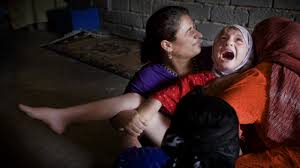Gambias president Yahya Jammeh opplyser at kjønnslemlestelse (FGM) av kvinner skal forbys. 76 prosent av landets kvinner har gjennomgått praksisen som innebærer fjerning av deler eller hele klitoris og kjønnslepper, men forbudet vil tre umiddelbart i kraft til tross for at den gambiske regjeringen enda ikke har utarbeidet noen lovgiving for å håndheve forbudet.
FGM involves cutting female genitalia – often when girls are young – to remove their labia and clitoris, which often leads to lifelong health complications, including bleeding, infections, vaginal pain and infertility. More than 130 million women worldwide are subjected to the procedure in Africa and the Middle East.
The practice is widespread in many African countries, including the Gambia, where 76% of females have been subjected to it. The age at which FGM takes place in the Gambia is not recorded, but it is reported that the trend of practicing FGM on infant girls is increasing. By the age of 14, 56% of female children in the country have had the procedure.
Den overraskende nyheten er blitt mottatt med glede av organisasjoner og aktivister som arbeider mot kjønnslemlestelse:
“I’m really amazed that the president did this. I didn’t expect this in a million years. I’m just really proud of my country and I’m really, really happy,” she [Jaha Dukureh] told the Guardian. “I think the president cared about the issue, it was just something that was never brought to his attention.
Dukureh mener imidlertid at annonseringen kan komme til å koste president Jammeh årets valg, ettersom det å sette kvinner og barn først kan få en negativ effekt for hans presidentkampanje:
“The amazing thing is it’s election season. This could cost the president the election. He put women and girls first, this could negatively affect him, but this shows he cares more about women than losing people’s votes,” said Dukureh.
Forbud mot kjønnslemlestelse er et kontroversielt og splittende tema i det overveiende islamske Gambia, hvor noen argumenterer for at lemlestelse nettopp er tillatt og sanksjonert i islam.
Muslimske ledere har da også fornektet at kjønnslemlestelse praktiseres i landet, men hevder at det bare forekommer «kvinnelig omskjæring».
Senior Muslim clerics in the Gambia have previously denied the existence of FGM in the Gambia saying instead that was is practiced is “female circumcision”. In 2014, state house imam, Alhaji Abdoulie Fatty told Kibaaro News, “I have never heard of anyone who died as a result of female genital mutilation (FGM)… If you know what FGM means, you know that we do not practice that here. We do not mutilate our children.”
 Merkverdig nok deles de muslimske ledernes forkjærlighet for eufemismen «kvinnelig omkjæring» av både Aftenposten og Dagbladet:
Merkverdig nok deles de muslimske ledernes forkjærlighet for eufemismen «kvinnelig omkjæring» av både Aftenposten og Dagbladet:
Aftenposten: Gambia forbyr kvinnelig omskjæring.
Dagbladet: Gambia forbyr omskjæring av kvinner.
Mary Wandia, the FGM programme manager at women’s rights campaign group Equality Now said: “The ban is an essential first step towards ending FGM and we commend President Jammeh on finally announcing it.
“A law must now be enacted and properly implemented to ensure that every girl at risk is properly protected. The government needs to show strong commitment and prioritise this issue in a country where three quarters of women have been affected and reductions in prevalence have been slow to materialise.”
Though support for FGM is widespread in the Gambia, reports have shown that public support for the practice has dropped in recent decades among women across all age groups.
Støtten for kjønnslemlestelse er størst blant landets rikeste kvinner og det er store variasjoner i de etniske gruppene. Således støttes den barbariske praksisen av 84 prosent av Mandinka-kvinner, mens bare 12 prosent av Wolof-kvinner.
I fjor forbød nigerianske myndigheter praksisen og ble dermed et av 18 andre afrikanske land som har innført forbud, som Den sentralafrikanske republikk, Egypt og Sør-Afrika. Et av landene hvor FGM er mest utbredt er Somalia, hvor myndighetene i den senere tid har antydet at de vurderer et lignende forbud. Om det er i dag blir 98 prosent av landets jenter i aldersgruppen fire til 11 blir utsatt for kjønnslemlestelse.

